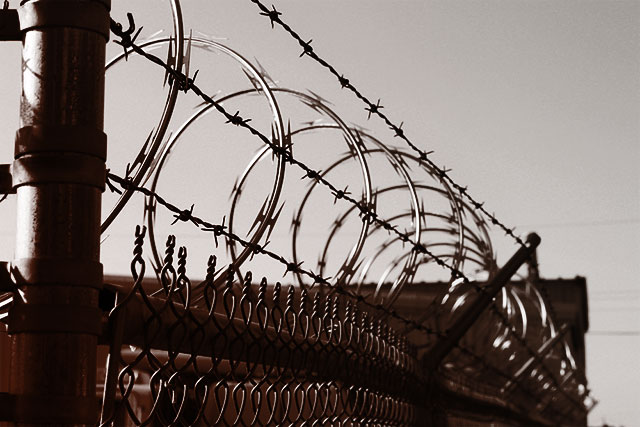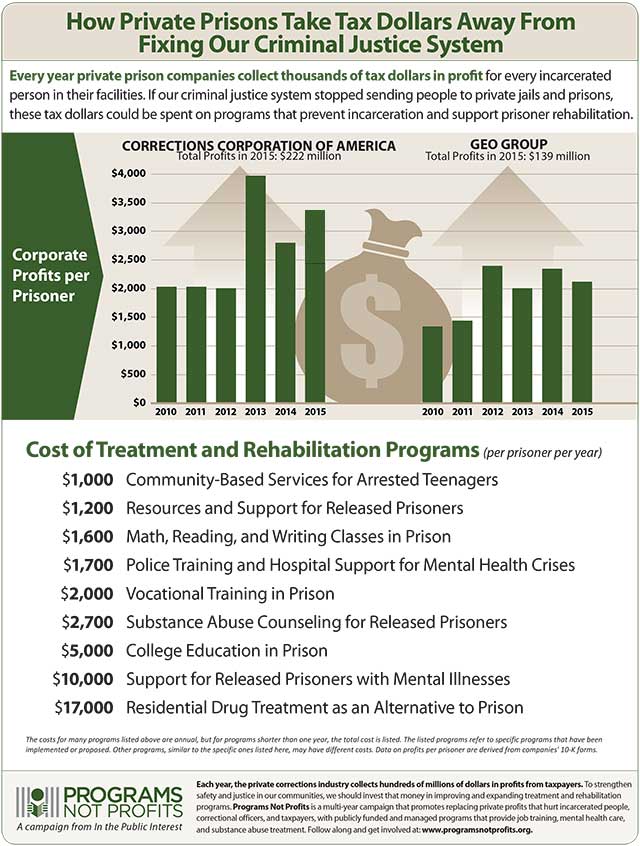
Honest, paywall-free news is rare. Please support our boldly independent journalism with a donation of any size.
Despite political momentum around prison and sentencing reforms, 2015 was another good year for the private prison business, thanks to “long-term customer relationships” and “strong and predictable occupancy rates,” as the private prison firm GEO Group puts it.
In annual reports recently submitted to federal regulators, GEO Group and another massive private prison company, Corrections Corporation of America (CCA), reported $139 million and $222 million in profits, respectively, over the past year. That translates to profit margins of $2,135 and $3,356 per individual prisoner held in the facilities run by the companies, according to the watchdog group In the Public Interest.
The private prison business is booming despite well-documented problems and even alleged human rights abuses, including several deaths in recent years at private immigrant jails with inadequate medical care. Both GEO Group and CCA have enjoyed steady increases in annual revenue over the past 15 years, and the companies reported a combined $3.6 billion in revenue during 2015 alone.
CCA and GEO Group are the largest private prison firms in the United States, and their annual reports offer an Orwellian glimpse into how corporations build business models around the caging of human beings.
Mass Incarceration = Stable Revenue
Most of the prison industry’s revenue comes from tax dollars and fees paid by prisoners themselves, and In the Public Interest argues that this money could be better spent on rehabilitation programs and alternatives to incarceration. The group’s data provoked strong reactions from opponents of prison privatization, including presidential candidate Sen. Bernie Sanders, who called private prisons a “racket.”
“We cannot fix our criminal justice system if corporations are allowed to profit from mass incarceration,” said Sanders, who introduced legislation last year that would ban federal contracts with private prison facilities. “Companies should not be allowed to make a profit by building more jails and keeping more Americans behind bars.”

However, Sanders’ legislation is largely symbolic and has little chance of making it out of committee. Few major politicians are joining the call to put restrictions on the private prison industry, which has spent tens of millions of dollars in lobbying and political contributions over the past 25 years as prison populations exploded.
The government now depends on private contractors to help run the sprawling prison system and house its 2.3 million prisoners. As GEO Group explains in its annual report, lucrative government contracts and “strong” rates of imprisonment generate a “stable and sustainable stream of revenue,” with a “customer retention rate” in excess of 90 percent.
Profits Climb Despite Talk of Reform
The United States has the highest incarceration rate in the world and spends about $80 billion per year on prisons and jails. With numbers like these circulating in the media, prison reform has been politically en vogue as of late, especially among liberals and fiscal conservatives. Additionally, the current movements for Black liberation have focused on policing and the criminal legal system, including the systematic racial targeting that fuels mass incarceration. GEO Group and CCA do not seem too concerned.
Last year, President Obama granted clemency to about 180 federal prisoners, most of them long-serving drug offenders. Also, the retroactive application of new federal sentencing guidelines for certain drug crimes reduced sentences for thousands more, including 2,000 prisoners of the failed drug war who faced deportation after being released.
Despite a small decrease in the federal prison population due these policies, CCA reports that its federal revenues actually increased in 2015. That’s because most of its federal facilities are now immigrant jails that hold people facing deportation, including a controversial “family” jail in Texas that opened in late 2014 in response to the migrant crisis.
Under most contracts for private prisons, the government pays CCA or GEO Group a fee based on the number of prison beds filled on a given day, so revenue and profit margins are often tied to occupancy rates. Contracts for immigrant jails, however, contain clauses guaranteeing that the companies are paid for a certain number of beds whether they are filled or not. These “bed quotas” are based on a federal mandate requiring that 34,000 beds be available for immigration detainees at all times.
Advocates say bed quotas encourage unnecessary detentions and waste taxpayer money, but they are great for private prison companies. Fees paid by Immigration and Customs Enforcement (ICE) accounted for 24 percent of CCA’s revenue and 17 percent of GEO Group’s revenue in 2015. Plus, CCA reports, public federal prisons are so overcrowded that their population may become another source of revenue if those prisoners are moved to private facilities in the future.
Fortunately for GEO Group and CCA, Congress has continuously failed to pass comprehensive immigration reform measures. Even in terms of general sentencing reform legislation – once hailed as a bipartisan consensus, and certain to pass – has stalled in the face of political roadblocks and tampering by special interests.
Meanwhile, state prisons hold a majority of US prisoners. A few states have recently enacted sentencing reforms that could reduce prison populations over time and eventually draw business away from private contractors. CCA, however, reports that many states are still experiencing prison population growth and overcrowding, and the company is in a “good position” to move into those markets.
Political liabilities do remain. The annual reports from both companies admit with strikingly similar language that prison privatization “has not achieved complete acceptance by either government agencies or the public,” and “public resistance” to prison privatization – along with negative publicity resulting from escapes, riots and other “inmate disturbances” – could threaten revenue streams.
It’s true that serious government reforms like those proposed by Sanders and other progressives could do a lot of damage to CCA and GEO Group, because they only have a handful of customers. CCA generates half of its revenue from federal agencies, and GEO Group gets more than half of its revenue from ICE, federal prisons, the US Marshals Service and the state of Florida.
Even modest reform proposals continue to flounder in Congress, however, and despite the new popularity of prison reform, some lawmakers are still wary of looking soft on crime during an election year.
If reforms do come, GEO Group and CCA will be ready. From providing ankle monitors for youth “supervision” to running DUI schools and substance abuse programs, the private industry has expanded into virtually every corner of the criminal legal system. After all, there are no better customers than those who don’t have many choices.
And just in case policy makers can’t find a way to reduce mass incarceration, GEO Group is currently keeping about 3,300 empty prison beds available “for new customers,” according to the firm’s annual report.
A terrifying moment. We appeal for your support.
In the last weeks, we have witnessed an authoritarian assault on communities in Minnesota and across the nation.
The need for truthful, grassroots reporting is urgent at this cataclysmic historical moment. Yet, Trump-aligned billionaires and other allies have taken over many legacy media outlets — the culmination of a decades-long campaign to place control of the narrative into the hands of the political right.
We refuse to let Trump’s blatant propaganda machine go unchecked. Untethered to corporate ownership or advertisers, Truthout remains fearless in our reporting and our determination to use journalism as a tool for justice.
But we need your help just to fund our basic expenses. Over 80 percent of Truthout’s funding comes from small individual donations from our community of readers, and over a third of our total budget is supported by recurring monthly donors.
Truthout has launched a fundraiser to add 340 new monthly donors in the next 5 days. Whether you can make a small monthly donation or a larger one-time gift, Truthout only works with your support.